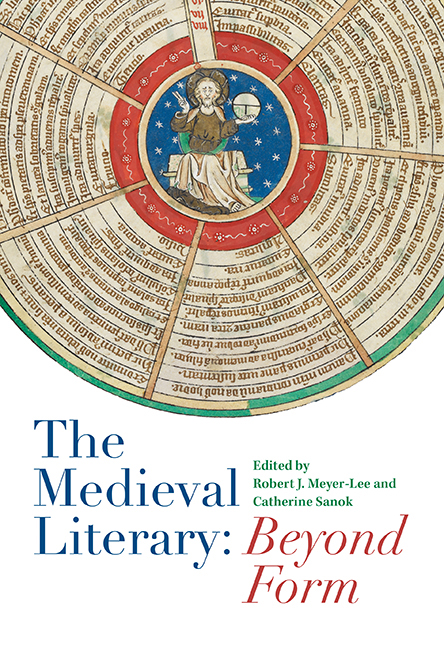Book contents
- Frontmatter
- Contents
- List of Illustrations
- Acknowledgments
- List of Contributors
- List of Abbreviations
- Introduction: The Literary through – or beyond? – Form
- I Instrumental Forms
- 1 What's the Use? Marian Miracles and the Workings of the Literary
- 2 Form's Practice: Lyrics, Grammars, and the Medieval Idea of the Literary
- 3 Forms of the Hours in Late Medieval England
- II Form Performed
- III Temporalities of Form
- Index
1 - What's the Use? Marian Miracles and the Workings of the Literary
from I - Instrumental Forms
Published online by Cambridge University Press: 12 October 2019
- Frontmatter
- Contents
- List of Illustrations
- Acknowledgments
- List of Contributors
- List of Abbreviations
- Introduction: The Literary through – or beyond? – Form
- I Instrumental Forms
- 1 What's the Use? Marian Miracles and the Workings of the Literary
- 2 Form's Practice: Lyrics, Grammars, and the Medieval Idea of the Literary
- 3 Forms of the Hours in Late Medieval England
- II Form Performed
- III Temporalities of Form
- Index
Summary
Considering the literary “beyond” form – with its implication of striking out into new territory – offers an encouragement to consider the boundaries that discussion of the literary sometimes seeks to establish. I consider here a particular realm often defined in opposition to the literary, that of use. Words like “functional,” “instrumental,” “utilitarian,” and so forth can appear quite unselfconsciously in discussions of formalist criticism to denote what is not literary, whether that unliterary quality has to do with textual objects themselves or critical approaches to them. But such a division of the literary from the useful is one that is hard to square with medieval texts, particularly those that engage with religious forms and topics; these tend to consider use not as a category opposed to the literary but as one that helps to establish and sustain it.
Miracles of the Virgin Mary, I argue here, offer a way to approach questions of use and the literary for two interlinked reasons: first, Marian miracles (and indeed Marian poetry in general) are often considered, by modern readers, to be sub-literary precisely because of their “utilitarian” or instrumental rather than self-contained aesthetic status; and, second, these works themselves are obsessed with, and indeed structured and generated by, certain conceptions of use in a way that makes this a creator of beauty rather than an alternative to it, something that helps to define literature from within rather than without. More specifically, these miracles are literary in that they present verbal forms that aim to make both characters and readers more attentive to the workings of language in itself and in its human effects. Their play of sameness and difference actively invites audiences to experience the effects of linguistic creativity on an emotional and a cognitive level – to feel, and to think about feeling, pleasure, dread, awe, and affection as these are activated through language – and, in some cases at least, to turn that experience to the creation of new verbal forms.
Marian (and other religious) texts’ evocation of this attentiveness to forms of language, however, may be difficult for modern readers to perceive as literary precisely because of its investment in use – in various senses.
- Type
- Chapter
- Information
- The Medieval Literary: Beyond Form , pp. 15 - 34Publisher: Boydell & BrewerPrint publication year: 2018



